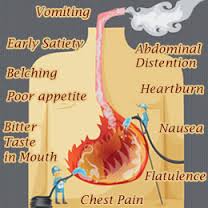About 15 million Americans experience heartburn, acid reflux and GERD daily. This occurs when muscles in the lower end of the esophagus abnormally weaken or relax.
This allows stomach acid to back up and cause:
- A burning sensation behind the breastbone
- A sour taste in the mouth
- The sensation of food re-entering the mouth
Chronic heartburn can lead to serious complications
When left untreated, chronic heartburn can result in gastroesophageal reflux disease (GERD). In addition to heartburn, GERD causes chest pain, difficulty swallowing, coughing, anemia, ulcers and regurgitation of food or sour liquid. Over a period of years, GERD can cause a hoarse, raspy or weak voice. It can also lead to Barrett’s Esophagus, a condition that increases the risk of esophageal cancer.
Are there differences between Heartburn, Acid Reflux & GERD?
What Is Heartburn?
Technically, heartburn is the symptom you feel when acid splashes up and out of the stomach. “Heartburn” is sometimes used interchangeably with “acid reflux” or known as “acid indigestion.” Sometimes these symptoms can also cause chest pain.
What Is Acid Reflux? 
Acid reflux is the backward flow of stomach acid into the esophagus — the tube that connects the throat and stomach. Acid reflux is more specifically known as gastroesophageal reflux. During an episode of acid reflux, you may taste regurgitated food or sour liquid at the back of your mouth or feel a burning sensation in your chest (heartburn).
What Is GERD (Gastroesophageal Reflux Disease)?
GERD (gastroesophageal reflux disease) or also known as Barrett’s Esophagus is severe or chronic acid reflux that can lead to complications, such as cancer. The most common symptom of GERD is frequent heartburn. Other signs and symptoms may include regurgitation of food or sour liquid, difficulty swallowing, coughing, wheezing, and chest pain — especially while lying down at night.
If you have occasional acid reflux, lifestyle changes can help: Lose excess weight, eat smaller meals, and avoid foods that seem to trigger heartburn — such as fried or fatty foods, chocolate, and peppermint. Avoiding alcohol and nicotine may help, too.
If necessary, occasional acid reflux can be treated with over-the-counter medication, including:
- Antacids, such as Tums
- H-2-receptor blockers, such as cimetidine (Tagamet HB) or famotidine (Pepcid AC)
- Proton pump inhibitors, such as omeprazole (Prilosec OTC)
Do I Have Heartburn or GERD?
Constant heartburn turns into GERD – otherwise called gastroesophageal reflux disease.
Getting to the bottom of your symptoms is the first step.
At Suburban Gastroenterology, our board-certified specialists will take your history and assess your symptoms. Then, to directly evaluate your esophagus for signs of acid reflux, we will perform an Upper Endoscopy in the convenience and privacy of our state-of-the-art endoscopy center — DuPage County’s only state-licensed, accredited and Medicare-approved freestanding endoscopy center.
After that, we will design a custom treatment plan to help you get past the discomfort and back to living your life.
In most cases, treatment begins with medical management of the reflux with medications; however, surgical repair or Transoral Incisionless Fundoplication (TIF) may be the best choice in certain cases. But in every case, our highly capable specialists will provide the advanced care and heartfelt compassion necessary to uncover and correct the underlying cause of your heartburn rather than just treat your symptoms.
If you suspect that you have GERD, your signs and symptoms worsen, or you experience nausea, vomiting or difficulty swallowing, please call our office at (630) 527-6450 or Request an Appointment online to meet with one of our compassionate specialists at Suburban Gastroenterology.


